Stolen Generations
'Sorry' apology to Stolen Generations
On 13 February 2008, Aboriginal people the prime minister of Australia, Kevin Rudd, finally apologises to the Stolen Generations. Read media views of the apology, check out polls and how Australians received the apology.

Wishing you knew more about Aboriginal culture? Search no more.
Get key foundational knowledge about Aboriginal culture in a fun and engaging way.
This is no ordinary resource: It includes a fictional story, quizzes, crosswords and even a treasure hunt.
Stop feeling bad about not knowing. Make it fun to know better.
White Australia's responsibility, like its shame, is monstrous.
— The Sydney Morning Herald [1]
Video: Kevin Rudd's apology
Watch the main excerpt of Kevin Rudd's speech in parliament on February 13th, 2008.
Apology transcript
Show
The Speaker of the House (Hon Harry Jenkins MP): The Clerk.
The Clerk: Government business notice number 1, Motion offering an apology to Australia's Indigenous peoples.
The Speaker: Prime Minister.
Prime Minister (Hon Kevin Rudd MP): Mr Speaker, I move:
That today we honour the Indigenous peoples of this land, the oldest continuing cultures in human history.
We reflect on their past mistreatment.
We reflect in particular on the mistreatment of those who were Stolen Generations - this blemished chapter in our nation's history.
The time has now come for the nation to turn a new page in Australia's history by righting the wrongs of the past and so moving forward with confidence to the future.
We apologise for the laws and policies of successive Parliaments and governments that have inflicted profound grief, suffering and loss on these our fellow Australians.
We apologise especially for the removal of Aboriginal and Torres Strait Islander children from their families, their communities and their country.
For the pain, suffering and hurt of these Stolen Generations, their descendants and for their families left behind, we say sorry.
To the mothers and the fathers, the brothers and the sisters, for the breaking up of families and communities, we say sorry.
And for the indignity and degradation thus inflicted on a proud people and a proud culture, we say sorry.
We the Parliament of Australia respectfully request that this apology be received in the spirit in which it is offered as part of the healing of the nation.
For the future we take heart; resolving that this new page in the history of our great continent can now be written.
We today take this first step by acknowledging the past and laying claim to a future that embraces all Australians.
A future where this Parliament resolves that the injustices of the past must never, never happen again.
A future where we harness the determination of all Australians, Indigenous and non-Indigenous, to close the gap that lies between us in life expectancy, educational achievement and economic opportunity.
A future where we embrace the possibility of new solutions to enduring problems where old approaches have failed.
A future based on mutual respect, mutual resolve and mutual responsibility.
A future where all Australians, whatever their origins, are truly equal partners, with equal opportunities and with an equal stake in shaping the next chapter in the history of this great country, Australia.
Story: Kevin's inside story of the apology
In an exclusive interview with the Koori Mail newspaper Kevin Rudd explained how he managed to get the apology through parliament [2].
"I thought 'how would you get something like this through the Parliament, on a bipartisan basis, so that the [Opposition] owned it' because, as history has proven, I wasn't going to be around forever."
"Given where [the Opposition] were at the time—and remember that a number of them didn't come in the end—I had to abe very mindful of how much they would bear without turning their backs.
"You heard the remarks made on the day, which reflected all the internal tensions on the conservative side of politics and their attitude towards Indigenous people.
"But I was waiting for the one thing from the leader of the Opposition and that was 'The Opposition supports this motion'.
"That's all I was looking for [so] I grabbed [Federal Opposition leader Dr] Brendan [Nelson] by the hand and led him around the chamber to meet all of the Aboriginal Elders and all of those sort of folk.
"I picked up the coolamon from Stolen Generations member Aunty Elaine Peeters and, it wasn't scripted, but I said to Brendan, 'Oi, Sunshine, you're coming with me and we're presenting this together to the Speaker'. I deliberately hijacked him."
Mr Rudd said he "played by instinct" all the way through the occasion and chose not to react to "all of the negative things" Dr Nelson said in his reply speech, but resisted.
"I did that because I wanted to entrench it in the heart and soul of the Parliament so that these things were not changeable, fundamentally, in the future," Mr Rudd said.
Sorry Day in the print media
Below are the headlines of newspapers across Australia about Sorry Day, 13 February 2008. Most of them feature the famous word 'Sorry' in their headlines, a word many Aboriginal people came to Canberra to hear on that historic day.
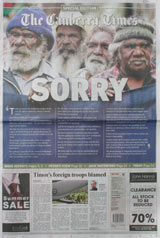
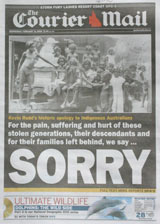
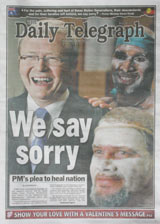
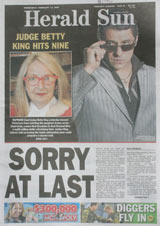
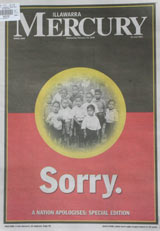
.jpg)
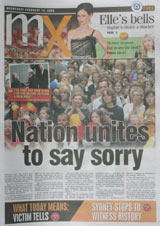
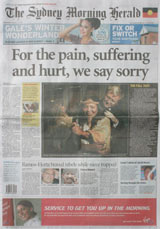
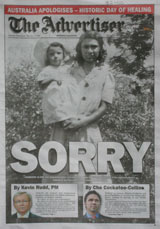
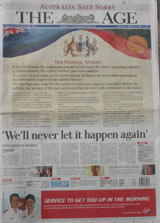
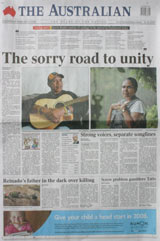
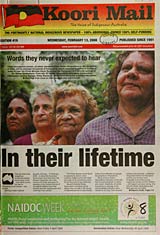
Statistics are like bikinis. What they reveal is suggestive, but what they conceal is vital.
— Aaron Levenstein, associate professor of business administration, Baruch College, New York
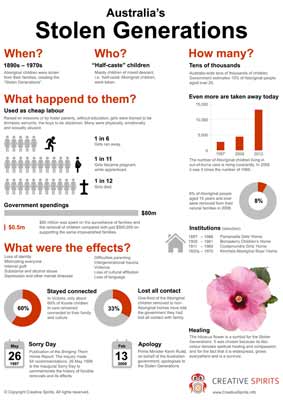
Poll results
I reproduce some 'sorry' apology poll results in this section. When you read or use these statistics be careful how you interpret them and remember:
Pre-apology polls (1997)
The following set of three polls is cited wildly throughout 'sorry' apology articles, but few mention the second question of the Morgan poll which reveals an interesting result.
Should the government say 'sorry'? (asked in 1997)
- Yes (1)
- 65%
- No (1)
- 30%
- Yes (2)
- 50%
- No (2)
- 40%
- Yes (3)
- 37%
- No (3)
- 57%
1: AGB McNair (2,065 votes), 2: Newspoll (1,200 votes), 3: Morgan (522 votes); www.news.com.au
[What is your opinion on] whether or not there should be a federal government apology?
- Apologise even if it makes it easier to claim compensation
- 23%
- Apologise only if it does not make it easier to claim compensation
- 27%
- Not apologise because it is enough [sic] individual politicians to apologise
- 10%
- Not apologise because the policy was legal and well meaning at the time
- 37%
Morgan poll as above; source: www.apo.org.au, 522 votes
The 1997 apology polls were conducted before the Bringing Them Home report was tabled in government and show mixed results.
One reason might be because they had varying numbers of respondents. The McNair poll had almost four times as many people voting as the Morgan poll. In polling, as with every work based on statistics, you need a certain number of answers to reach a statistically representative amount of data.
The other problem lies in the question of the polls which varied greatly between polls.
The McNair poll informed readers about the HREOC submission and asked if "all Australian parliaments acknowledge the responsibility" for "the forcible removal of Aboriginal children from their families".
The Newspoll asked simply whether the government should apologise to the Aboriginal people because of "the events revealed."
The Morgan poll explained at length that the then Prime Minster John Howard had decided against giving an apology and that the government was not responsible "for errors, wrongs and misdeeds of earlier generations".
Interestingly, the Morgan poll had a second question immediately after this one, asking "whether or not there should be a federal government apology", not mentioning the Prime Minster at all and providing four instead of just two possible answers.
In that question the results are turned upside down. 50% agree that an apology should be made while 47% disagree. This is a good example how a different question can, in the same poll, skew the responses.
How much will an apology to the Stolen Generations help towards achieving Aboriginal reconciliation?
- Very much
- 34%
- Moderately
- 14%
- Not very much
- 18%
- Not at all
- 34%
www.theaustralian.news.com.au, October 2007, 6,735 votes
The The Australian poll is interesting as it also offers four questions for respondents to scale their opinion. The large number of votes helps achieve a statistically significant cross-section.
The poll shows again that the Australian nation was still divided in half. 48% thought that an apology helped very much or moderately while 52% thought the apology did not help very much or not at all.
These results are roughly consistent with the other polls we've discussed so far.
Post-apology polls (2008)
After Kevin Rudd had made his historic 'sorry' apology many Australians shifted their opinion and voted differently in polls.
Rate Kevin Rudd's apology
- Excellent
- 62%
- Good
- 16%
- Average
- 5%
- Poor
- 1%
- Don't agree with it
- 16%
smh.com.au, February 2008, 34,967 votes
How do you rate Kevin Rudd's 'sorry'?
- Great
- 47%
- Good
- 10%
- Average
- 4%
- Poor
- 3%
- Don't agree with it
- 37%
canberratimes.com.au, February 2008, 721 votes
The Sydney Morning Herald poll is the most significant of these two because the sheer amount of votes makes it almost representative.
78% of the respondents thought that Kevin Rudd's 'sorry' apology was excellent or good. Only 6% disapproved of the apology while 16% disagreed with it.
The Canberra Times poll with well below 1,000 votes is far less significant but confirms a strong shift towards support of the apology.
The fairly high percentage of disagreeing respondents might be due to the paper's 'left wing thinking' readership who are possibly more in favour of the Liberal party which, for 11 years, opposed an apology to Australia's Stolen Generations.
Responses to the apology
I encourage you to make up your own mind about Prime Minister Kevin Rudd's 'sorry' apology. The following quotes give you food for thought. I have separated them into Indigenous and non-Indigenous so you can easily find trends and common thoughts.
Aboriginal responses
I feel great. I'm on top of the world, I'm floating on air. It's a big weight off my shoulders... It's the closure I need.
— Archie Roach, 52, Aboriginal singer and songwriter and member of the Stolen Generations [3]
The apology will help to heal the scars but it will never heal my pain and hurt.
— Mary Farrell-Hooker, 50, member of the Stolen Generations [4]
I fully welcome the apology to the Stolen Generation as a lot of people will now know what took place.
— Alec Kruger, 83, member of the Stolen Generations [4]
I'm really encouraged and buoyed by the chance that has been taken here to really open the door to the process of healing.
— Dr Alex Brown, Aboriginal doctor [5]
The word 'sorry' doesn't come near what [my father] went through. They can apologise in a thousand different ways without saying sorry. Actions speak louder than words.
— Norman Stewart, son of a Stolen Generations member [6]
To me, our Prime Minister's apology is saying to my granny and the thousands like her, their children, grandchildren and great grandchildren, that we understand your pain and we acknowledge this long-ignored chapter in our history.
— Che Cockatoo-Collins, head of the Indigenous Sports Academy, Port Adelaide [7]
I am inspired by this apology as an act of true reconciliation towards Indigenous Australia.
— Mick Dodson, co-chairman of Reconciliation Australia [8]
Kevin Rudd's eloquent and culturally sensitive words undoubtedly facilitated the lifting of the heavy emotional load from the frail shoulders of those beautiful, resilient Stolen Generations victims.
— Stephen Hagan, Aboriginal academic [9]
Sorry
Sorry for the lies you told For the children you stole Hearts that don't bleed Hearts so cold. Came to this land With guns in hand An ancient culture You wish to disband. Taken our rights By days and by nights Killing our people And not hearing our plights. Now it's the future And someone has spoken Time to move on And to heal the broken.
Poem by Kamilaroi man Neville James Draper [10] who was born on 13 February. Read more Aboriginal poetry.
It is a very emotional time and I'm so pleased that he has said sorry.
— Muriel Bablett, National Aboriginal and Torres Strait Islander Child Care Agency [8]
Sorry may just be a word, but it should help the history of our past come back into our curriculum for the current generation to learn... An apology will mean a monumental weight has been lifted from people's shoulders.
— Sudye Jackson, retired Aboriginal footballer [11]
[It's] an apology not just for me, but for my mother and for my father and for my children who carry the burden and carry the weight of what happened to us stolen kids.
— Archie Roach, Aboriginal singer and song-writer [12]
The wording of Mr Rudd's apology goes a long, long way to end the distrust of the white man by generations of my people.
— Lloyd McDermott, member of the NSW Bar Association [13]
No matter what our colour or our creed, at heart, from this day forward, we are all fundamentally Australian.
— Noel Tovey, Aboriginal dancer and member of the Stolen Generations [14]
Australians of goodwill will be hoping that the apology on this day will be a real beginning for the brown-skin baby's spiritual journey home.
— Kirstie Parker, editor, Koori Mail [15]
In my heart I feel there is a real need for [the apology]... For my family, it allows some kind of healing and forgiveness to take place where there is less anger and bitterness in the hearts of people.
— Cathy Freeman, Aboriginal athlete [16]
An apology will mean that people believe us, that this has happened and that we are not liars.
— Cahill McCarthy, Stolen Generation member [17]
See, [the apology] was like a great weight dropped away and we can go on in a positive aspect together and get out of the kindergarten stage we've been in for too flamin' long."
— Kev Carmody, Aboriginal singer and songwriter [18]
For the first time in my sister's life she wept in front of the TV while she was watching Kevin say sorry. All these years she and I had held the pain.
— Aunty Rhonda Collard, Aboriginal artist [19]
Blackfellas will get the words, the whitefellas will keep the money.
— Noel Pearson, Aboriginal elder [18]
Nobody else in the country wanted to touch the apology but Kevin Rudd, when he was Prime Minister, decided to step up and to lead by example. It wasn't just a brave thing, it was the right thing.
— Archie Roach, Aboriginal singer and songwriter [20]
It was never about guilt. It's history. The truth is the truth.
— Neil Barney, Melbourne [21]
It's been absolute closure. I was taken when I was 10... This apology was something I really needed to hear.
— Murray Harrison, Ballarat [21]
There has always been this hole in my heart with regards to being Australian. And today the speech by the Prime Minister was just so spot-on that it filled that little hole.
— Warren Mundine, Aboriginal leader and the former National President of the Australian Labor Party [21]
I can remember feeling a wave of emotion that completely engulfed me, because he had cut to the core about the truth of our nation.
— Helen Moran, Aboriginal co-chair, National Sorry Day Committee [21]
It's not doing anything for me, it wont' give back my years.
— Rhonda Maynard, East Davenport, Tasmania [21]
After the apology services who help Aboriginal people find and connect with their lost loved ones (such as Link-Up) noticed "a big increase" in requests. There was also a shift in people's minds that is was now less shameful to reveal one's Aboriginal heritage. [22]
.jpg)
Non-Indigenous responses
The overwhelming majority of non-Indigenous Australians received the apology to the Stolen Generations positively. A minority did not agree with the apology or even denied that the Stolen Generations exist.
When Prime Minister Kevin Rudd said the words 'I am sorry' a wave of emotion and a process of healing began across the nation.
— Brett Solomon, executive director of community advocacy organisation GetUp [23]
The whole sorry thing is really to satisfy the white population, not the black population. Until whites give back to black their nationhood, they can never claim their own, no matter how many flags they fly.
— John Pilger, expat Australian journalist [24]
The PM's apology expresses my concern, empathy and desire that this will begin some psychological and spiritual healing.
— Joanne Gardiner, General Practitioner [25]
I was very encouraged to hear on the news about the apology [Mr Rudd] made in parliament to all Aborigines for laws and policies that 'inflicted profound grief, suffering and loss' upon them.
— Dalai Lama [26]
If someone can prove to me that there were stolen generations, I could change my mind... The children in most cases were given up by parents or guardians who were unable to look after them.
— Barbara Witte [27]
Now I realise that [the apology] is not about black people or white people, it's really about families.
— Man talking to Gary Highland (National Director, ANTAR) [28]
It was a mistake for us not to apologise to Aboriginal people.
— Tony Abbott, opposition spokesperson on Indigenous Affairs, about the Howard government [29]
Now I believe that the colour bar which I intuitively feel still operates and works against us, will start to fade away.
— Deborah Ruiz Wall (of Filipino-Australian descent), Newtown, Sydney [30]
We have stopped telling ourselves the comfortable lie.
— Clover Moore, Lord Mayor, Sydney [21]
Kevin Rudd's apology and Australian schools
Should students stop classes to watch Kevin Rudd's apology on TV?
- Yes
- 28%
- No
- 71%
The Daily Telegraph, 13 February 2008, 1,771 votes
In NSW, government schools were told to fly the Aboriginal flag and stop lessons during the apology so that students could watch the apology live on television. Many parents were upset about this.
A majority of over 70% agreed that students should not swap classes with the apology.
The parent's reaction reminds us of parents in 1883 which also threatened to withdraw their children from school if 15 Aboriginal students would not leave. In those times the Aboriginal children were ordered out of school.
Let the brainwashing begin... This is school, not a politburo meeting. The Education Department and teachers are there to teach children how to think, not what to think. I consider pulling any child of mine out of school for the day.
— Damien Holland, newspaper reader [31]
This is a disgrace. There are plenty of people out there who do not agree with the apology, who have kids going to public schools... Mr Rudd does not speak for me, my children or my ancestors.
— Nicky, newspaper reader [31]
If my kids' school does this, they're staying home! I'm disgusted!
— Tony, newspaper reader [32]
It's not enough that students simply know of Prime Minister Kevin Rudd's sorry to these 'generations' of 'stolen' children no one can actually find. To children we actually saved.
— Andrew Bolt, editor Herald Sun [33]
Schoolchildren will be watching history, and I wish I was still at school to witness such an occasion with fellow new-generation Australians.
— Peter Ellis, newspaper reader [31]
Get that nigger band off!
— School teacher responding to an Aboriginal student wearing a coloured wrist band [34]
The white people's concerns are starkly opposed by the response of a young Aboriginal boy who, until the apology, was a "quiet, almost sullen, boy who kept to himself" because Aboriginal people were often criticised for no reason [34].
Watching the apology on television transformed the boy. He is now proud of his Nyoongar heritage, started to learn to play the didgeridoo and lead the music on the day of the school celebrations.
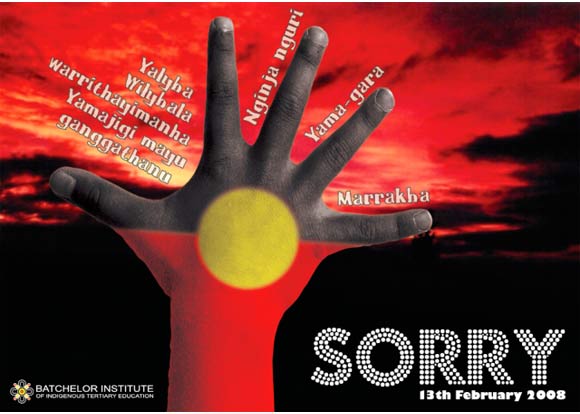
Apologies made in other countries
Belgium
The prime minister of Belgium apologised on 4 April 2019 for the targeted kidnapping, segregation, deportation and forced adoption of thousands of mixed-race children (so-called métis) during its 80-year colonial rule of Burundi, Congo and Rwanda. It was the first time Belgium recognised responsibility for the trauma it caused. [35]
"I present our apologies to the métis stemming from the Belgian colonial era and to their families for the injustices and the suffering inflicted upon them," said the prime minister.
Despite racial segregation and a ban on interracial marriage in Belgium's colonies, many white Belgian men married black Congolese women. Belgian authorities separated an estimated 10,000 to 20,000 métis children from both their families and the black population. They were placed in orphanages and schools predominantly run by the Catholic Church, which apologised in 2017 for its actions.
Canada
Canada apologised On 11 June 2008, to its Indigenous peoples for its past actions that eroded "the political, economic and social systems of Aboriginal people and nations". The government acted on a report which had been tabled two years earlier.
From the 19th century until the 1970s—dates very similar to Australia's own history—more than 150,000 Aboriginal children were required to attend state-funded schools in an attempt to assimilate them into Canadian society [36] and the purpose of "killing the Indian in the child". [37] They were forbidden from speaking their native languages or participating in cultural practices.
There were an estimated 130 residential schools across Canada. An estimated 90,000 survivors fight to have their stories recorded.
The last Residential School closed in 1996.
In May 2006 the Canadian government reached a CDN$1.9-billion settlement to compensate survivors. The settlement created a national Truth and Reconciliation Commission.
We Were Children (directed by Tim Wolochatiuk, 2011, 83 min) chronicles the profound impact of the Canadian government’s residential school system through the eyes of two children who were forced to face hardships beyond their years. As young children, Lyna and Glen were taken from their homes and placed in church-run boarding schools, where they suffered years of physical, sexual and emotional abuse, the effects of which persist in their adult lives.
New Zealand
New Zealand apologised in 1995 to a Maori tribe for stealing 500,000 hectares of land 130 years earlier. That apology became law. [38]
Taiwan
President Tsai Ing-wen formally apologised to Taiwan's indigenous people on 1 August 2016 for centuries of suffering and unfair treatment, becoming the island's first-ever leader to do so. [39]
Tsai, Taiwan's only leader with aboriginal blood, said she'll personally head a committee to investigate past injustices as part of government efforts to ease tensions with the native community.
Taiwan's indigenous community comprises 16 recognised tribes that make up about 2% of Taiwan's 23.5 million people.
I apologise to the indigenous people on behalf of the Government, to give our deepest apology over the suffering and injustice you endured over the past 400 years.
— Taiwan's President Tsai Ing-wen [39]
Apology resources
Documentary The Apology
Reconciliation Australia has released a special documentary "to remind and refresh Australians about how it feels to heal and to see things can be better between us."
The documentary, titled The Apology, is narrated by Jack Thompson with music from Powderfinger, Silverchair, Missy Higgins, John Butler and the Stiff Gins. It features behind-the-scenes footage from the two days leading up to the apology, and the event itself. The Apology runs for 30 minutes.
You can order a free copy at www.reconciliation.org.au/.
"Stand Together"
Australian songwriter Paul Bonner Jones wrote Stand Together.
| Year | Apology to... |
|---|---|
| 2008 | Stolen Generations |
| 2009 | Child migrants put into institutions (Forgotten Australians) |
| 2013 | Women forced to adopt out their children |
| 2018 | Child sexual abuse victims and survivors |